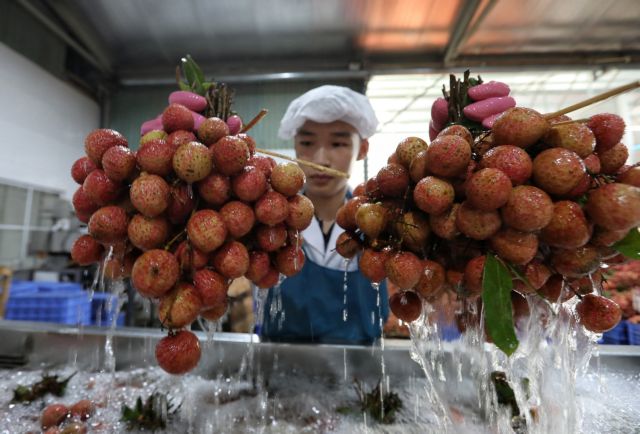Vietnamese businesses are advised to better exploit the UK-Viet Nam Free Trade Agreement (UKVFTA) to build and develop their brands to expand presence in the UK market amid stiffer competition driven by the “Global Britain” policy.

Vietnamese businesses are advised to better exploit the UK-Viet Nam Free Trade Agreement (UKVFTA) to build and develop brands and expand their presence in the UK market amid stiffer competition driven by the “Global Britain” policy.
After Brexit, Britain is reaching new partners as an independent actor and Viet Nam, together with Singapore, are the two ASEAN countries that have signed a free trade deal with the UK, showing their important position in the UK’s trade policy.
The UKVFTA, which officially came into force in May 2021, has been a key driver for rapid trade growth between the two markets.
Total trade in goods and services (exports plus imports) between the UK and Viet Nam reached £5.7 billion (US$6.6 billion) in the four quarters to the end of Q1 2022, up 15 per cent from the four quarters to the end of Q1 2021, the latest data from the UK’s Department for International Trade showed.
Of this, Viet Nam’s exports to the UK increased 18.3 per cent to £4.8 billion, while total UK exports to Viet Nam amounted to £905 million, up 0.2 per cent.
Despite the growth, ample room is unexploited when Viet Nam is the UK’s 36th largest trading partner, accounting for just 0.4 per cent of total UK trade.
Opportunities from trademark registration
Tran Quang Vu, head of the Strategy Development and Export of Mr. Cua's Rice, shared the company’s trademark registration story in the UK and other markets with Viet Nam News.
Soc Trang-based ST25 fragrant rice, developed over 25 years by Ho Quang Cua and his colleagues, won the World’s Best Rice title in 2019, marking the first time a Vietnamese variety had claimed the top spot in the contest’s 11-year history.
Vu said after being awarded, many businesses overseas registered a trademark for ST25 rice in the US, Australia and some European countries, causing difficulties for Vietnamese exporters who want to export this rice to these markets.
Therefore, Ho Quang Tri Enterprise, the owner of Mr. Cua’s Rice brand, hired international law firm Baker & McKenzie to assist in registering the trademark in overseas markets. To date, the trademark of Mr. Cua's Rice had been approved in the EU, UK, mainland China and Hong Kong. The application was being processed in Australia, the US and Viet Nam.
“Since having the certification, many businesses overseas have actively contacted our company, wanting to be an exclusive distributor,” Vu said, adding the reputation has given the rice good marketing conditions but having a protected trademark makes both the company and foreign partners more confident when reaching out to the world.
Sharing about the difficulties during the trademark application process, Vu said Vietnamese companies should hire a professional law firm to do the work as each country has different legal requirements.
“It saves time and even costs,” Vu said.
In June, more than 23 tonnes of Mr. Cua's rice was exported to the UK under trademark protection.
Vu said the ST25 and ST24 rice varieties were being processed to add to the list of rice that enjoy preferential tariffs under the UKVFTA.
Denzel Eades, vice president of Britcham Vietnam, said: “Vietnamese brands have a fantastic opportunity to expand market share through a combination of the advantages conferred by the UKVFTA and their ability to distinguish themselves from established brands.”
He said Vietnamese brands and products were becoming increasingly popular in the UK and recommended Vietnamese businesses engage as much as possible with consumers in the UK to understand the market and to assist in building a brand.
“New brands seeking to enter the UK can gain competitive advantage through increasing awareness of UK customer demand and preferences whilst capitalising on the benefits of having been produced in Viet Nam,” Eades said, suggesting Vietnamese enterprises reach out to organisations such as Britcham to understand and access the market.

Currently, to facilitate the importers, Vietnamese enterprises are often willing to allow distributors to use their own brands. For example, Vietnamese rice is sold under UK brands such as Longdan, Golden Lotus, Buffalo, Green Dragon and Red Ant.
The reason is that the exporter has not built their own brand names, so they are not known to local consumers. In addition, local distributors consider their own brands to be more effective in marketing than exporters' brands.
However, Britain is negotiating to join the Comprehensive and Progressive Agreement for Trans-Pacific Partnership and after the deal is signed, the advantages of preferential tariffs that Vietnamese products are enjoying under the UKVFTA will diminish, that’s why Vietnamese enterprises need to soon assert their positions in the UK. Trademark registration can be considered the first and most important step in this strategy.
According to Vo Tri Thanh, director of the Institute of Branding and Competition Strategy, the businesses themselves should be active in building their brands, contributing to the growth of the national brand. To do that, it is necessary to invest in market research, thereby creating products that are suitable for local consumers' preferences, especially developing product standards to ensure the transparency of the production process, catching up with the green lifestyle trend. — VNS





